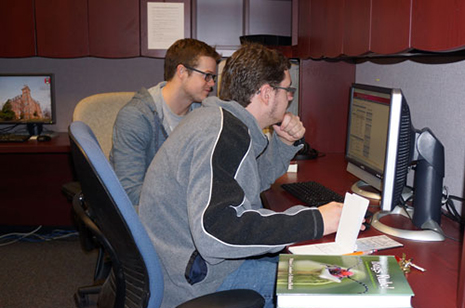
FAYETTEVILLE, Ark. – The University of Arkansas Autism Support Program recently became one of the first recipients of scholarship funding from Autism Speaks, one of the world’s leading autism science and advocacy organizations.
The $25,000 from the Autism Speaks Brian & Patricia Kelly Postsecondary Scholarship Fund will provide scholarships, beginning in the fall of 2014, to eligible students to help defray the costs of services provided by the university’s Autism Support Program. The award was the maximum amount possible to receive from the grant. The U of A program was one of 11 institutions and programs to receive funds.
The College of Education and Health Professions established the Autism Support Program two years ago to assist U of A students with autism spectrum disorders. It provides 15 to 20 hours of direct contact each week with program staff, including academic coaches, peer mentors and the program director at a cost of $5,000 per semester.
“This program is providing a tremendous benefit to students on our campus who have an autism spectrum disorder,” said Tom Smith, dean of the College of Education and Health Professions. “We greatly appreciate support from an organization of the caliber of Autism Speaks in helping us continue this important work.”
The Brian & Patricia Kelly Postsecondary Scholarship was established by the parents of a 16-year-old with autism. Brian Kelly is a founding executive committee member of the Autism Speaks board of directors and the chair of the Autism Speaks Family Services committee.
“We are honored that such a distinguished organization as Autism Speaks chose our program to receive these funds,” said Aleza Greene, director of the Autism Support Program at the U of A. “The money will be extremely helpful to our deserving students and their families and, through the intensive support services they receive from our program, these students will be able to enjoy the same fulfilling college experience as their neuro-typical peers.
“The ultimate goal is that these students graduate and go on to have gratifying, productive and happy lives,” she continued.
The scholarships will be awarded on a merit basis. Students already enrolled in the program can apply for the scholarship this spring. Awards will be used toward the program fee for the 2014-15 academic year.
Autism is a neurological disorder. The U.S. Centers for Disease Control and Prevention estimates that 1 in 88 children in the United States have an autism spectrum disorder. Five pervasive developmental disorders make up autism spectrum disorders, all characterized by varying degrees of impairment in communication skills, social interactions, and restricted and repetitive patterns of behavior.
“Students who qualify for this program are fully capable of doing academic work but might have trouble figuring out university life,” Greene said. “They often experience more anxiety about day-to-day tasks and social situations. We want to be sure they get class work done in a timely fashion and are aware of all the social opportunities on campus.”
The Autism Support Program’s staff members help students through registration and orientation, learning the campus, meeting and communicating with instructors, keeping up with course material and assignments, study skills and time management. Peer mentors help students become familiar with residence hall living and accompany students as they participate in a variety of social and extracurricular activities on campus.
The College of Education and Health Professions also offers several academic programs for professionals who work with students with autism spectrum disorders. In addition to a master’s degree in special education, the college offers a graduate certificate in autism spectrum disorders and a graduate certificate in applied behavior analysis. Special education faculty members provide services at the newly opened Applied Behavior Analysis Family Service and Research Clinic in the Epley Center for Health Professions and supervise graduate students working in the clinic.
Contacts
Aleza Greene, director
University of Arkansas Autism Support Program
479-595-6071,
Heidi Wells, content writer and strategist
Global Campus
479-879-8760,